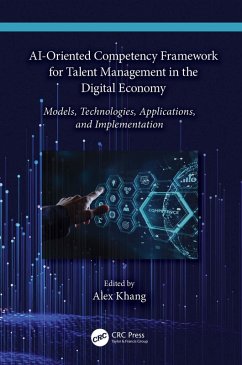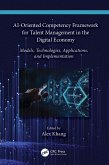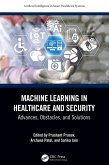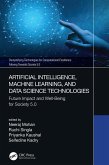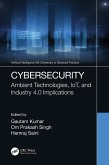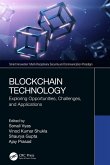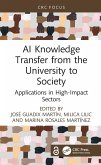AI-Oriented Competency Framework for Talent Management in the Digital Economy (eBook, PDF)
Models, Technologies, Applications, and Implementation
Redaktion: Khang, Alex
182,95 €
182,95 €
inkl. MwSt.
Sofort per Download lieferbar

91 °P sammeln
182,95 €
Als Download kaufen

182,95 €
inkl. MwSt.
Sofort per Download lieferbar

91 °P sammeln
Jetzt verschenken
Alle Infos zum eBook verschenken
182,95 €
inkl. MwSt.
Sofort per Download lieferbar
Alle Infos zum eBook verschenken

91 °P sammeln
AI-Oriented Competency Framework for Talent Management in the Digital Economy (eBook, PDF)
Models, Technologies, Applications, and Implementation
Redaktion: Khang, Alex
- Format: PDF
- Merkliste
- Auf die Merkliste
- Bewerten Bewerten
- Teilen
- Produkt teilen
- Produkterinnerung
- Produkterinnerung

Bitte loggen Sie sich zunächst in Ihr Kundenkonto ein oder registrieren Sie sich bei
bücher.de, um das eBook-Abo tolino select nutzen zu können.
Hier können Sie sich einloggen
Hier können Sie sich einloggen
Sie sind bereits eingeloggt. Klicken Sie auf 2. tolino select Abo, um fortzufahren.

Bitte loggen Sie sich zunächst in Ihr Kundenkonto ein oder registrieren Sie sich bei bücher.de, um das eBook-Abo tolino select nutzen zu können.
This book discusses all the points of an AI-Oriented Competency Framework which includes predictive analytics, advisory services, predictive maintenance, and automated processes, which help to make the operations of project management, personnel management, or administration more efficient, profitable, and safe.
- Geräte: PC
- mit Kopierschutz
- eBook Hilfe
Andere Kunden interessierten sich auch für
![AI-Oriented Competency Framework for Talent Management in the Digital Economy (eBook, ePUB) AI-Oriented Competency Framework for Talent Management in the Digital Economy (eBook, ePUB)]() AI-Oriented Competency Framework for Talent Management in the Digital Economy (eBook, ePUB)182,95 €
AI-Oriented Competency Framework for Talent Management in the Digital Economy (eBook, ePUB)182,95 €![Machine Learning in Healthcare and Security (eBook, PDF) Machine Learning in Healthcare and Security (eBook, PDF)]() Machine Learning in Healthcare and Security (eBook, PDF)52,95 €
Machine Learning in Healthcare and Security (eBook, PDF)52,95 €![Artificial Intelligence, Machine Learning, and Data Science Technologies (eBook, PDF) Artificial Intelligence, Machine Learning, and Data Science Technologies (eBook, PDF)]() Artificial Intelligence, Machine Learning, and Data Science Technologies (eBook, PDF)51,95 €
Artificial Intelligence, Machine Learning, and Data Science Technologies (eBook, PDF)51,95 €![Cybersecurity (eBook, PDF) Cybersecurity (eBook, PDF)]() Cybersecurity (eBook, PDF)51,95 €
Cybersecurity (eBook, PDF)51,95 €![Blockchain Technology (eBook, PDF) Blockchain Technology (eBook, PDF)]() Blockchain Technology (eBook, PDF)52,95 €
Blockchain Technology (eBook, PDF)52,95 €![Blockchain Technology (eBook, PDF) Blockchain Technology (eBook, PDF)]() Blockchain Technology (eBook, PDF)65,95 €
Blockchain Technology (eBook, PDF)65,95 €![AI Knowledge Transfer from the University to Society (eBook, PDF) AI Knowledge Transfer from the University to Society (eBook, PDF)]() AI Knowledge Transfer from the University to Society (eBook, PDF)0,00 €
AI Knowledge Transfer from the University to Society (eBook, PDF)0,00 €-
-
-
This book discusses all the points of an AI-Oriented Competency Framework which includes predictive analytics, advisory services, predictive maintenance, and automated processes, which help to make the operations of project management, personnel management, or administration more efficient, profitable, and safe.
Dieser Download kann aus rechtlichen Gründen nur mit Rechnungsadresse in A, B, BG, CY, CZ, D, DK, EW, E, FIN, F, GR, HR, H, IRL, I, LT, L, LR, M, NL, PL, P, R, S, SLO, SK ausgeliefert werden.
Produktdetails
- Produktdetails
- Verlag: Taylor & Francis eBooks
- Seitenzahl: 456
- Erscheinungstermin: 29. Mai 2024
- Englisch
- ISBN-13: 9781040022252
- Artikelnr.: 70302170
- Verlag: Taylor & Francis eBooks
- Seitenzahl: 456
- Erscheinungstermin: 29. Mai 2024
- Englisch
- ISBN-13: 9781040022252
- Artikelnr.: 70302170
- Herstellerkennzeichnung Die Herstellerinformationen sind derzeit nicht verfügbar.
Alex Khang is a Professor in Information Technology, IT Workforce Development Consultant, Software industry expert, Software product manager for High-tech Corporations in Vietnam, EU and USA; AI and Data scientist, and Chief of technology officer at the AI and Data Science Research Center, Global Research Institute of Technology and Engineering, North Carolina, United States.
Chapter 1. Future directions and challenges in designing Workforce
Management Systems for Industry 4.0. Chapter 2. The significance of
Artificial Intelligence in career progression and career pathway
development. Chapter 3. The role of Artificial Intelligence in Talent
Management and Career Development. Chapter 4. The power of Artificial
Intelligence in Talent Recruitment Revolution: Creating a Smarter
Workforce. Chapter 5. Challenges of communication with Gen-Z in the era of
Artificial Intelligence-Interceded Digital Economy. Chapter 6. Modern work
ecosystem and career prospects with Artificial Intelligence Integration.
Chapter 7. Artificial intelligence Competency Framework: Navigating the
shift to an Artificial Intelligence-Infused World. Chapter 8. Building the
perfect match using Artificial Intelligence in Career Development. Chapter
9. Artificial intelligence-Powered Competency Framework for Robo-Advisory
Services in the era of Digital Economy. Chapter 10. Future-proofing Talent
Management: Anticipating the evolution of AIoCF model in the Digital
Economy. Chapter 11. Enrich Skills Recommendation based on Sentiment
Analysis using Ensemble Learning. Chapter 12. Revamping the hiring process
using WebRTC, AWS Cloud and Gaze Tracking Application. Chapter 13.
Conceptual Analysis Study: A paradigm shift transformation in Human
Resource Management. Chapter 14. Shaping Artificial Intelligence-Perceived
Hybrid Learning Environment at University toward the Global Talent
Development Strategy. Chapter 15. The Role of Artificial Intelligence in
developing an effective Training Assessment Tool. Chapter 16.
Revolutionizing Recruitment: Skill-Based Interview Models in the Artificial
Intelligence-Driven Economy. Chapter 17. Design and Modelling of Artificial
Intelligence-Oriented Competency Framework for Information Technology
Sector. Chapter 18. Workforce Management: An endeavour towards optimizing
excellence of Higher Education Institutes. Chapter 19. Accelerating
Student's Creativity in writing paragraph through Artificial Intelligence
Technology. Chapter 20. Implementation of AIOCF model and Job Assessment
Application for Information Technology Sector. Chapter 21. Artificial
Intelligence-Centric Applications in Data Privacy and Cybersecurity for
Human Resource Systems. Chapter 22. Cybersecurity Techniques in Talent
Management and Human Capital Management Systems. Chapter 23. Role of
Augmented Reality and Virtual Reality in the Post Covid-19 Scenario of
Employees Training. Chapter 24: Designing Artificial Intelligence-Enabled
Training Approaches and Models for Physical Disabilities Individuals.
Chapter 25: Human-Centered Approach as a Methodological Tendency of
Personnel Management in Workplace.
Management Systems for Industry 4.0. Chapter 2. The significance of
Artificial Intelligence in career progression and career pathway
development. Chapter 3. The role of Artificial Intelligence in Talent
Management and Career Development. Chapter 4. The power of Artificial
Intelligence in Talent Recruitment Revolution: Creating a Smarter
Workforce. Chapter 5. Challenges of communication with Gen-Z in the era of
Artificial Intelligence-Interceded Digital Economy. Chapter 6. Modern work
ecosystem and career prospects with Artificial Intelligence Integration.
Chapter 7. Artificial intelligence Competency Framework: Navigating the
shift to an Artificial Intelligence-Infused World. Chapter 8. Building the
perfect match using Artificial Intelligence in Career Development. Chapter
9. Artificial intelligence-Powered Competency Framework for Robo-Advisory
Services in the era of Digital Economy. Chapter 10. Future-proofing Talent
Management: Anticipating the evolution of AIoCF model in the Digital
Economy. Chapter 11. Enrich Skills Recommendation based on Sentiment
Analysis using Ensemble Learning. Chapter 12. Revamping the hiring process
using WebRTC, AWS Cloud and Gaze Tracking Application. Chapter 13.
Conceptual Analysis Study: A paradigm shift transformation in Human
Resource Management. Chapter 14. Shaping Artificial Intelligence-Perceived
Hybrid Learning Environment at University toward the Global Talent
Development Strategy. Chapter 15. The Role of Artificial Intelligence in
developing an effective Training Assessment Tool. Chapter 16.
Revolutionizing Recruitment: Skill-Based Interview Models in the Artificial
Intelligence-Driven Economy. Chapter 17. Design and Modelling of Artificial
Intelligence-Oriented Competency Framework for Information Technology
Sector. Chapter 18. Workforce Management: An endeavour towards optimizing
excellence of Higher Education Institutes. Chapter 19. Accelerating
Student's Creativity in writing paragraph through Artificial Intelligence
Technology. Chapter 20. Implementation of AIOCF model and Job Assessment
Application for Information Technology Sector. Chapter 21. Artificial
Intelligence-Centric Applications in Data Privacy and Cybersecurity for
Human Resource Systems. Chapter 22. Cybersecurity Techniques in Talent
Management and Human Capital Management Systems. Chapter 23. Role of
Augmented Reality and Virtual Reality in the Post Covid-19 Scenario of
Employees Training. Chapter 24: Designing Artificial Intelligence-Enabled
Training Approaches and Models for Physical Disabilities Individuals.
Chapter 25: Human-Centered Approach as a Methodological Tendency of
Personnel Management in Workplace.
Chapter 1. Future directions and challenges in designing Workforce
Management Systems for Industry 4.0. Chapter 2. The significance of
Artificial Intelligence in career progression and career pathway
development. Chapter 3. The role of Artificial Intelligence in Talent
Management and Career Development. Chapter 4. The power of Artificial
Intelligence in Talent Recruitment Revolution: Creating a Smarter
Workforce. Chapter 5. Challenges of communication with Gen-Z in the era of
Artificial Intelligence-Interceded Digital Economy. Chapter 6. Modern work
ecosystem and career prospects with Artificial Intelligence Integration.
Chapter 7. Artificial intelligence Competency Framework: Navigating the
shift to an Artificial Intelligence-Infused World. Chapter 8. Building the
perfect match using Artificial Intelligence in Career Development. Chapter
9. Artificial intelligence-Powered Competency Framework for Robo-Advisory
Services in the era of Digital Economy. Chapter 10. Future-proofing Talent
Management: Anticipating the evolution of AIoCF model in the Digital
Economy. Chapter 11. Enrich Skills Recommendation based on Sentiment
Analysis using Ensemble Learning. Chapter 12. Revamping the hiring process
using WebRTC, AWS Cloud and Gaze Tracking Application. Chapter 13.
Conceptual Analysis Study: A paradigm shift transformation in Human
Resource Management. Chapter 14. Shaping Artificial Intelligence-Perceived
Hybrid Learning Environment at University toward the Global Talent
Development Strategy. Chapter 15. The Role of Artificial Intelligence in
developing an effective Training Assessment Tool. Chapter 16.
Revolutionizing Recruitment: Skill-Based Interview Models in the Artificial
Intelligence-Driven Economy. Chapter 17. Design and Modelling of Artificial
Intelligence-Oriented Competency Framework for Information Technology
Sector. Chapter 18. Workforce Management: An endeavour towards optimizing
excellence of Higher Education Institutes. Chapter 19. Accelerating
Student's Creativity in writing paragraph through Artificial Intelligence
Technology. Chapter 20. Implementation of AIOCF model and Job Assessment
Application for Information Technology Sector. Chapter 21. Artificial
Intelligence-Centric Applications in Data Privacy and Cybersecurity for
Human Resource Systems. Chapter 22. Cybersecurity Techniques in Talent
Management and Human Capital Management Systems. Chapter 23. Role of
Augmented Reality and Virtual Reality in the Post Covid-19 Scenario of
Employees Training. Chapter 24: Designing Artificial Intelligence-Enabled
Training Approaches and Models for Physical Disabilities Individuals.
Chapter 25: Human-Centered Approach as a Methodological Tendency of
Personnel Management in Workplace.
Management Systems for Industry 4.0. Chapter 2. The significance of
Artificial Intelligence in career progression and career pathway
development. Chapter 3. The role of Artificial Intelligence in Talent
Management and Career Development. Chapter 4. The power of Artificial
Intelligence in Talent Recruitment Revolution: Creating a Smarter
Workforce. Chapter 5. Challenges of communication with Gen-Z in the era of
Artificial Intelligence-Interceded Digital Economy. Chapter 6. Modern work
ecosystem and career prospects with Artificial Intelligence Integration.
Chapter 7. Artificial intelligence Competency Framework: Navigating the
shift to an Artificial Intelligence-Infused World. Chapter 8. Building the
perfect match using Artificial Intelligence in Career Development. Chapter
9. Artificial intelligence-Powered Competency Framework for Robo-Advisory
Services in the era of Digital Economy. Chapter 10. Future-proofing Talent
Management: Anticipating the evolution of AIoCF model in the Digital
Economy. Chapter 11. Enrich Skills Recommendation based on Sentiment
Analysis using Ensemble Learning. Chapter 12. Revamping the hiring process
using WebRTC, AWS Cloud and Gaze Tracking Application. Chapter 13.
Conceptual Analysis Study: A paradigm shift transformation in Human
Resource Management. Chapter 14. Shaping Artificial Intelligence-Perceived
Hybrid Learning Environment at University toward the Global Talent
Development Strategy. Chapter 15. The Role of Artificial Intelligence in
developing an effective Training Assessment Tool. Chapter 16.
Revolutionizing Recruitment: Skill-Based Interview Models in the Artificial
Intelligence-Driven Economy. Chapter 17. Design and Modelling of Artificial
Intelligence-Oriented Competency Framework for Information Technology
Sector. Chapter 18. Workforce Management: An endeavour towards optimizing
excellence of Higher Education Institutes. Chapter 19. Accelerating
Student's Creativity in writing paragraph through Artificial Intelligence
Technology. Chapter 20. Implementation of AIOCF model and Job Assessment
Application for Information Technology Sector. Chapter 21. Artificial
Intelligence-Centric Applications in Data Privacy and Cybersecurity for
Human Resource Systems. Chapter 22. Cybersecurity Techniques in Talent
Management and Human Capital Management Systems. Chapter 23. Role of
Augmented Reality and Virtual Reality in the Post Covid-19 Scenario of
Employees Training. Chapter 24: Designing Artificial Intelligence-Enabled
Training Approaches and Models for Physical Disabilities Individuals.
Chapter 25: Human-Centered Approach as a Methodological Tendency of
Personnel Management in Workplace.
